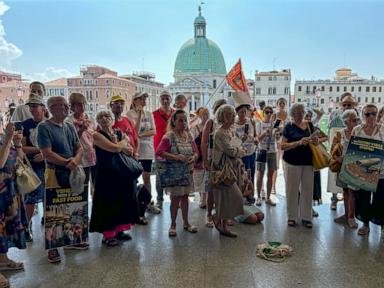MILAN — Venice city officials said Friday that the day-tripper tax netted 2.4 million euros ($2.6 million) during a test phase this summer, and that decisions on how to proceed would be made in the fall after a full analysis of the data.
According to the city, the 5-euro tax was paid 485,062 times over the 29 test days, mostly weekends and holidays, from April 25 to July 14. The final numbers included paper access tickets sold to bus tours, cruise ships and some tour operators, accounting for about 1,000 entrances on each of the test days.
Italians accounted for 60% of visitors to the ticket website in the period, followed by U.S., German and French citizens, ranging from 6.5% to 4% of the totals.
City officials have indicated that the system, where day-trippers pay an entrance fee, would be extended next year, and doubled to 10 euros, at least on some days, but did not make any immediate announcements.
Mayor Luigi Brugnaro said that the city would consider adjusting the fee based on if the tax is paid in advance, or at the last minute. He defended the tourist tax from critics, who called it a failure for allegedly not deterring arrivals, as envisioned.
“We listened to citizens, to associations, to thousands of people, but in the end, there were no alternative solutions to ours,” Brugnaro said. “We thought to take this road of the controls, which were light enough, not invasive.”
Visitors not staying in lodging in the city were required to download a QR code showing they had paid the tax; officials said that the average length of the transaction was 2 minutes. Hotel guests, who pay a lodging tax, were exempt, as were people living in the Veneto region, visitors under 14, and those visiting relatives, among others.
Venice has long been grappling with overtourism, with estimates of 25 million to 30 million annual arrivals of both day-trippers and overnight guests roughly confirmed by cell phone data tracked from a Smart Control Room since 2020, according to city officials.
The day-tripper tax, delayed by the pandemic, was heralded by UNESCO member states when they decided against a recommendation to place the city on its list of world heritage sites in danger. The city had escaped inclusion on the list two years earlier when it imposed a cruise ship ban down the Giudecca canal and through St. Mark’s Basin.
The city’s top tourist official, Simone Venturini, said the entrance fee marked “a cultural revolution.”
“For the first time in the world, a city has an instrument that allows to finally have clear data, and not just approximate estimates, not longer interpretations of data, but exact data” of people entering and leaving the city,’’ he said.
___
This story has been corrected to show that Italians accounted for 60% of visitors to the ticket website, not 60% of visitors to Venice.
